Hemoglobin A1C (often referred to as simply A1C) is a critical metric used in the management of diabetes. It provides an overview of a person’s average blood glucose levels over the past two to three months, offering valuable insights into their diabetes management and overall health. Understanding what constitutes a “good” A1C number is essential for both patients and healthcare providers. This article will explore the significance of the A1C test, what constitutes a good A1C number, factors affecting A1C levels, and how to achieve and maintain an optimal A1C.
Understanding A1C and Its Importance
1. What Is A1C?
A1C measures the percentage of hemoglobin in the blood that is coated with sugar (glycated hemoglobin). When blood glucose levels are high, more glucose attaches to hemoglobin, leading to a higher A1C result.
Testing Frequency: For people with diabetes, A1C tests are typically performed every three to six months. This regular monitoring helps track diabetes management effectiveness and make necessary adjustments to treatment plans.
2. Why Is A1C Important?
The A1C test is a cornerstone in diabetes management for several reasons:
Long-Term Glucose Control: Unlike daily blood glucose tests that can fluctuate, A1C provides a comprehensive view of long-term glucose control.
Risk Assessment: Higher A1C levels correlate with an increased risk of diabetes-related complications, such as heart disease, kidney damage, and nerve damage.
Guiding Treatment Decisions: Healthcare providers use A1C results to determine the effectiveness of current treatment plans and whether adjustments are necessary.
What Is Considered a Good A1C Number?
1. Normal A1C Levels
For individuals without diabetes, a normal A1C level is generally considered to be below 5.7%.
2. A1C Levels for Individuals with Diabetes
For people diagnosed with diabetes, the American Diabetes Association (ADA) recommends aiming for an A1C level of:
Below 7%: This is often considered a good target for most adults with diabetes. Maintaining an A1C below this threshold can significantly reduce the risk of diabetes-related complications.
3. Individualized Goals
It’s important to recognize that A1C targets can vary based on individual circumstances:
Older Adults: For older adults or those with a limited life expectancy, a less stringent A1C target of around 7.5% to 8.0% may be appropriate to avoid potential risks associated with tight glycemic control.
Children and Adolescents: Pediatric patients may have slightly different targets, and a goal of less than 7.5% is generally recommended.
Pregnant Women: For women with diabetes who are pregnant or planning to become pregnant, the target A1C is often set below 6.0% to reduce risks to the fetus.
4. Assessing A1C Results
When interpreting A1C results, it’s essential to consider the overall context:
Trends Over Time: It’s crucial to look at trends in A1C levels rather than just one isolated result. An upward trend may indicate a need for changes in diabetes management.
Acute Illness or Stress: Temporary illnesses or significant stress can lead to fluctuations in A1C. Therefore, it’s essential to assess the overall pattern of results.
Factors Affecting A1C Levels
Several factors can influence A1C results, including:
1. Blood Sugar Levels
Daily Fluctuations: Regular monitoring of blood glucose levels can help understand how daily habits affect A1C levels. Elevated blood glucose levels over time will result in a higher A1C.
2. Diet
Carbohydrate Intake: Consuming a diet high in refined carbohydrates and sugars can lead to spikes in blood glucose levels, negatively impacting A1C.
Nutrient Quality: A diet rich in whole foods, including vegetables, lean proteins, and healthy fats, can help maintain stable blood sugar levels.
3. Physical Activity
Exercise: Regular physical activity improves insulin sensitivity and helps lower blood sugar levels, contributing to better A1C results.
Sedentary Lifestyle: A lack of physical activity can lead to higher blood glucose levels and, subsequently, higher A1C readings.
4. Medications
Insulin and Oral Medications: The type and dosage of diabetes medications can significantly impact blood sugar control and A1C levels.
Adherence to Treatment: Consistent adherence to prescribed medication regimens is crucial for achieving and maintaining target A1C levels.
5. Stress
Emotional and Physical Stress: Stress can lead to hormonal changes that elevate blood glucose levels, affecting A1C results.
6. Other Health Conditions
Anemia or Blood Disorders: Conditions affecting hemoglobin levels can interfere with A1C testing accuracy, leading to misleading results.
Kidney Disease: Diabetes can affect kidney function, which may alter glucose metabolism and impact A1C levels.
How to Achieve and Maintain a Good A1C Number
Maintaining a good A1C number requires a comprehensive approach that includes lifestyle changes, medication management, and regular monitoring.
1. Implement a Healthy Diet
A balanced diet plays a significant role in blood sugar management. Here are some dietary strategies:
Choose Whole Foods: Focus on whole grains, lean proteins, healthy fats, and plenty of fruits and vegetables.
Limit Processed Foods: Reduce the intake of processed foods, sugary snacks, and beverages, which can spike blood sugar levels.
Monitor Carbohydrate Intake: Be mindful of carbohydrate portions. Utilizing tools such as carbohydrate counting can be helpful for managing intake.
Stay Hydrated: Drink plenty of water throughout the day. Staying hydrated can help with overall health and blood sugar control.
2. Exercise Regularly
Physical activity is essential for managing diabetes and improving overall health:
Aim for Consistency: The ADA recommends at least 150 minutes of moderate-intensity aerobic activity per week, such as brisk walking or cycling.
Include Strength Training: Incorporating resistance training at least twice a week can improve insulin sensitivity and help with weight management.
3. Monitor Blood Sugar Levels
Frequent monitoring of blood sugar levels can help individuals understand how various factors affect their glucose levels:
Keep a Log: Track daily blood glucose readings to identify patterns and triggers that may cause fluctuations.
Adjust Management as Needed: Use blood sugar data to inform decisions about diet, exercise, and medication adjustments.
4. Follow Medication Plans
Adherence to prescribed medication regimens is vital for maintaining good A1C levels:
Consult with Healthcare Providers: Regularly review medications with healthcare providers to ensure they are appropriate for current health needs.
Manage Side Effects: Be aware of potential side effects of diabetes medications and report any concerns to a healthcare provider.
5. Reduce Stress
Implementing stress-reduction techniques can improve overall well-being and blood sugar control:
Practice Mindfulness: Techniques such as meditation, deep breathing exercises, and yoga can help reduce stress levels.
Prioritize Sleep: Aim for quality sleep, as inadequate rest can negatively impact blood sugar levels.
6. Regular Healthcare Visits
Consistent check-ups with healthcare providers are crucial for effective diabetes management:
Regular A1C Testing: Adhere to recommended testing schedules to monitor progress and make informed decisions.
Comprehensive Health Checks: Discuss any concerns related to diabetes management, including complications or new symptoms.
Conclusion
A good A1C number is an essential aspect of diabetes management and plays a significant role in reducing the risk of complications. Generally, an A1C below 7% is considered optimal for most adults with diabetes. However, individualized goals may vary based on age, health status, and specific circumstances.
Achieving and maintaining a good A1C requires a multifaceted approach that includes a healthy diet, regular exercise, consistent blood sugar monitoring, adherence to medication regimens, and stress management. By prioritizing these elements, individuals with diabetes can optimize their health and well-being, leading to improved quality of life and reduced risk of diabetes-related complications.
It’s crucial for patients to work closely with their healthcare providers to establish personalized A1C goals and develop effective strategies for managing their diabetes. Understanding the significance of A1C and its implications is key to navigating the complexities of diabetes management successfully.
Related topics:
What Should Blood Sugar Be After Exercise?



























